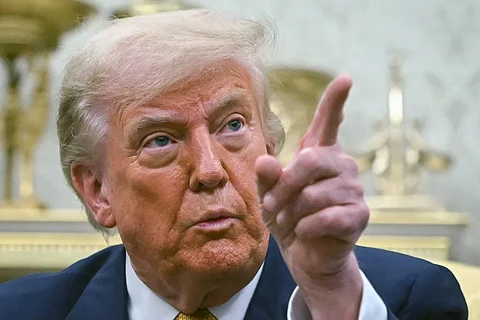

US President Donald Trump on Tuesday escalated pressure on India over its continued imports of Russian oil, announcing plans to "very substantially" raise tariffs on Indian goods "within the next 24 hours," up from the current 25 percent.
In a fresh warning, Trump also criticised India’s offer of zero tariffs on US imports as “not good enough,” alleging that New Delhi was “fuelling the war” in Ukraine through its energy trade with Moscow.
“They’re fuelling the war machine, and if they’re going to do that, then I’m not going to be happy,” Trump told CNBC, stating that the key sticking point was India's "very high" tariffs.
“India went from the highest tariffs ever. They will give us zero tariffs and let us go in. But that’s not good enough, because of what they’re doing with oil,” he said.
An Indian government official, speaking on condition of anonymity, said New Delhi’s purchases of Russian oil had helped stabilise global crude prices by easing supply pressure from other regions.
“If we stop buying Russian oil, who will replace those barrels to maintain balance in the market and at the same time prevent prices from shooting up? We don’t want a repeat of 2022 when prices surged to $137 a barrel,” the source said.
India, the world’s third-largest importer and consumer of oil, sources over one-third of its crude from Russia. Between January and June this year, imports averaged around 1.75 million barrels per day, up 1 percent from the same period last year, according to trade sources.
The Ministry of External Affairs has responded strongly to Trump’s remarks, stating that it was “unjustified to single out India” for its trade with Russia.
“It is revealing that the very nations criticising India are themselves indulging in trade with Russia,” the ministry said in a statement issued late Monday.
It pointed to figures showing that the European Union conducted €67.5 billion ($78 billion) in trade with Russia in 2024, including record imports of 16.5 million metric tonnes of liquefied natural gas. The US, it added, continues to import Russian uranium hexafluoride, palladium, fertilisers and chemicals.
The latest escalation follows Trump’s initial July 31 announcement of a 25 percent tariff on Indian goods, coupled with a vague threat of additional penalties. He has since pledged further sanctions on Russia and nations continuing to purchase its energy exports unless Moscow makes steps towards ending the war in Ukraine.
Despite Western pressure to reduce its ties with Moscow, India has maintained its long-standing defence and trade relationship with Russia, citing strategic and economic interests.
India's National Security Adviser Ajit Doval is expected to proceed with a planned visit to Russia this week, with External Affairs Minister S. Jaishankar likely to follow in the coming weeks, according to two government sources.
Concerns are mounting that escalating trade tensions could impact India’s economy. On Tuesday, the benchmark BSE Sensex closed 0.38 per cent lower, while the Indian rupee weakened 0.17 per cent against the dollar.